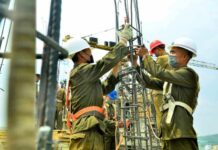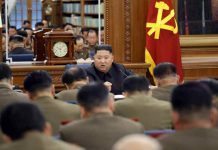With its December 12th long-range rocket launch, North Korea moved a step closer to getting its ICBM technology right. As such, there is a pressing need for policy reviews both at home and abroad on issues such as the Six-Party Talks and Seoul’s stance on North Korea’s nuclear weapons.
It is abundantly clear that North Korea intends to continue down its chosen path. Since the successful launch, the Kim Jong Eun regime has moved to emphasize the fact that there are to be more such launches, and not merely via the placing of a model “Unha-9” rocket in the arms of a snowman on the fringes of a televised concert by Moranbong Band on December 21st.
There is also the ever-present danger of a third nuclear test, which South Korean government officials, mindful of the way North Korea moved toward its second such test in the year following President Lee Myung Bak’s own inauguration, fear could happen with little prior warning. Speaking on January 2nd, Minister of National Defense Kim Kwan Jin reminded reporters, “They’ve been steadily preparing for a nuclear test for some time now; all that is needed is for the order to conduct it to be handed down.
“Because North Korea sees possession of a combination of nuclear and ICBM capabilities as its international political power, it is always going to be important to take the chance to show that off,” Kim added at the time.
In response, President-elect Park has repeatedly emphasized how important both the Six-Party Talks and cooperation with surrounding countries remain if the “North Korea problem” is to be solved. However, there is widespread expert skepticism about the existing framework for dealing with nuclear and missile issues.
According to Lee Chun Geun of Korea Economic Research Institute, “The Six-Party Talks were meant to stop North Korea’s nuclear development work; but, contrary to this aim, they provided a good shield behind which to keep doing it instead. It will be all-but impossible to achieve the goal of North Korean denuclearization in that way.”
Former Minister of National Defense Kim Jang Soo, who is part of Park’s transition team, recently commented that there is “no alternative to cooperation between the surrounding countries” on North Korea. This is true, and with the advent of the second Obama administration and selection of John Kerry to head the State Department, there is set to be an element of synergy on North Korea policy in Washington DC and Seoul. However, the keys will remain in Beijing, and experts say that, as such, ways must be found to elevate the role of the Chinese government of General-Secretary Xi Jinping. They say this will require much closer Sino-South Korean and Sino-U.S. strategic dialogue.
The current signs for Sino-South Korean relations are good. President-elect Park is said to have a good relationship with General-Secretary Xi, and the Chinese state media reacted in friendly style to her Chinese language ability at the time of her election. Such a good start may help her administration, and could contribute much to the systematization of bilateral dialogue, not to mention progress on the subject of a Sino-South Korean Free Trade Agreement.
Professor Hong Yong Pyo of Hanyang University in Seoul said of this, “During the Lee Myung Bak administration, relations between South Korea and the United States have been good, but there have been areas of difficulty between South Korea and China and this seems to have led to currents of distrust between the two leaders. In President-elect Park’s case, she is friendly with General-Secretary Xi, which could earn her the trust of the Chinese side.”
But friendship will not be enough. If Park is to solve the North Korea problem, she will also need to find a viable solution to pursue, and this is the problem. As one anonymous expert noted, “Kim Jong Eun will certainly never give up his nuclear and missile capabilities, which he needs for the continued existence of his system,” adding instead, “The nuclear and missile problems will solve themselves naturally if there is a big change, such as Kim regime change or reform and opening.”
Indeed, according to NKnet researcher Kim Young Hwan, “There is very, very little chance of bringing about North Korean denuclearization through dialogue, no matter what diplomatic or economic price is paid.”
Rather, Kim added, “More realistic results could be produced if just half that amount were invested in reform, opening and democratization.”




















